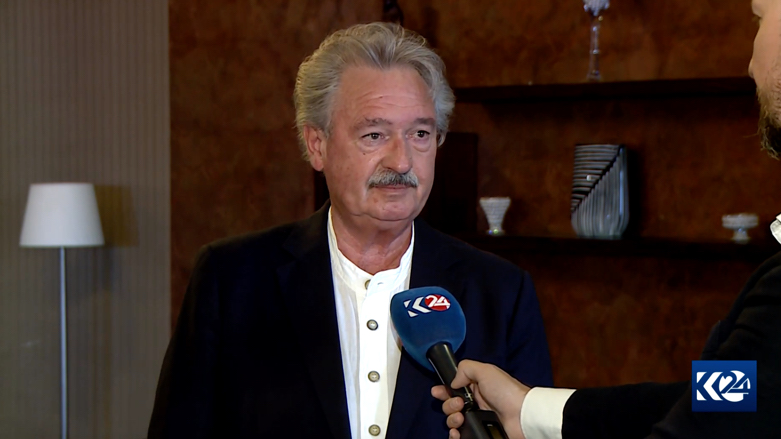Luxembourg's Foreign Minister calls Iran’s missile attack on Erbil ‘unacceptable’

ERBIL (Kurdistan 24) – In an exclusive interview with Kurdistan 24, Luxembourg's Minister of Foreign and European Affairs Jean Asselborn condemned Iran's missile attack on Erbil on March 13th and emphasized that it is unacceptable for a neighboring country to attack the Kurdish Region’s capital.
“This is an act of war. And I hope that the crimes committed by the Russians in Ukraine is not something that is imitated here in this region – you have already not easygoing neighbors here.”
He underlined that the missile attack is a “violation of international law” and “an act of war.”
“Iraq has no easygoing neighbors. Influence of some neighbors is huge in Iraq. But the future of Iraq must also be founded on sovereignty,” he said.
“And you Iraqis, you have the destiny of your country in your hands. I know that mentality is a little bit different in Baghdad than in Erbil, but you are one country. We have this in a lot of countries in the world.”
“So my advice is not that it's not an advice for Baghdad or Erbil, but just we consider you as one country with the specificity clearly, of Kurdistan and of seeing very well that you have a population and you have to Kurdish population trying to live together.”
Luxembourg's Minister of Foreign and European Affairs Asselborn also visited the Kurdistan Region and other places in Iraq in 2015 and 2016 during the fight against ISIS.
Read More: VIDEO: Benelux Union will provide KRG military, humanitarian support
“What I see today is this really very lively Kurdistan and Erbil and I really hope that peace will come, stability will come and I think it's an interest of everybody in Iraq, in Kurdistan, and the European Union.”
Asselborn’s current visit to Iraq came by invitation from Yezidi survivors in November 2021. Minister Asselborn started his visit in Baghdad on 29th of March, where he met with President Salih, Prime minister al-Kadhimi, Foreign minister Hussein and Speaker al-Halbousi.
He also met with Kurdistan Region President Nechirvan Barzani, the President of the Kurdistan Democratic Party (KDP) Masoud Barzani, the Head of the Department of Foreign Relations Safeen Dizayee, as well as the governors of Erbil and Duhok
Read More: PHOTOS: Luxembourg's FM tours Erbil's main market
He underlined that Luxembourg wants “first to increase our relations with Iraq, and that's clear but above all, also in Kurdistan.”
“I visited Duhok and I think that this is very important to show that after each war, you have refugees in this (Kurdistan) region, and that in the European Union, also in a country like Luxembourg, we do everything not to forget this.”
He underlined that the European Union considers Iraq as one country. “(But) we know the difference between Baghdad and Kurdistan and Erbil.”
However, he said the main reason for his visit was to meet with Yezidi survivors, who endured the ISIS genocide in August 2014. “I have known Nadia Murad for years and years, she visited me twice in Luxembourg, and last November, I also had a delegation of survivors who came to Luxembourg and I promised to visit them.”
Asselborn visited Yezidi camps in Duhok. “I spoke with some of them and they refuse to leave the camp because they say it is not secure enough in Sinjar.”
He also met the Duhok governor, whose province hosts thousands of displaced Yezidis from Sinjar. “He is really a governor who has a good heart I think really, because he accepted thousands and thousands of people who had to flee from Sinjar.”
However, Asselborn underlined that the governor did not want the Yezidis to go to Europe. “He wants to keep them in Iraq and to do everything they can do.”
He said it is necessary to implement the Yezidi survivor law, which will offer financial compensation to survivors of the genocide committed against the Yezidi community. However, officials in Baghdad told him that this law requires a budget. “And I hope that soon there is a new government.”
Read More: Civil society organizations warn Yezidi Survivors Law needs more financial support
“We are in the 21st century and it happened in 2014. Now we are eight years later, and a lot of these people are still in camps.”
